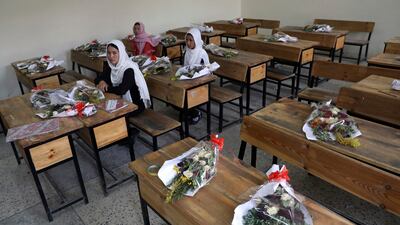Migrants who returned to their homeland in the past decade are likely to leave again if the Taliban seize power in Afghanistan, a study has found.
Citing fears for their security and the impact on gender equality if the Taliban were to regain control of the country, almost half of those questioned said they would move countries once more.
Dr Janroj Yilmaz Keles, senior research fellow at the UK’s Middlesex University who co-led the research project, said returnee migrant women in Kabul and Kandahar were playing an important role in the rebuilding of the country while contributing to gender equality and helping to transform from extremist and patriarchal social structures to more liberal ones.
“With the return of the Taliban, however, this process will be stopped and the people who were interviewed clearly explained when the Taliban come back to power, they will leave Afghanistan,” said Dr Keles.
“This brain drain migration will have a devastating outcome for Afghanistan, particularly for the women and girls.
“Most returnees are the same people who fled the extremist ideology and brutal practices of the Taliban in the 90s and returned to their homeland after the collapse of the Taliban regime.
“They have invested in their families, small business activities and professional careers over the past 20 years in Afghanistan.
“Although they still faced many challenging issues such as security, housing, severe electricity and water shortages and gender-based harassment and violence, they had no plans to leave again until now because they had the hope they would be part of rebuilding an Afghanistan that men and women live in equality.”
The UN said on Monday that Afghanistan could see the highest number of civilian deaths in more than a decade if the Taliban's offensives across the country are not halted.
Violence has surged since early May, when the insurgents cranked up operations to coincide with a final withdrawal of US-led foreign forces.
“Unprecedented numbers of Afghan civilians will perish and be maimed this year if the increasing violence is not stemmed,” Deborah Lyons, head of the UN Assistance Mission in Afghanistan, said in a statement released with the report.
“I implore the Taliban and Afghan leaders to take heed to the conflict's grim and chilling trajectory and its devastating impact on civilians.”
During the first half of 2021, some 1,659 civilians were killed and another 3,254 wounded, the mission's report said — a 47 per cent increase on the same period last year.
More than 22,000 Afghan families have fled their homes to escape fighting in the former Taliban bastion of Kandahar, officials said, with authorities arresting four suspected insurgents over this week's rocket attack on Kabul.
The Taliban's deadly assault has led to the insurgents capturing scores of districts and border crossings as well as encircling several provincial capitals.
Middlesex University spoke to 196 Afghans who had fled as refugees in the 1990s and had started returning in the last decade.
They said their two main reasons for coming back to the country were because the political situation had improved (16 per cent) and for family reasons (15 per cent).
The research found 56.6 per cent of the refugees had originally emigrated to either Pakistan, Iran or India, with 32 per cent moving to Europe, North America or Australia before returning home where they had found jobs in education (15.3 per cent), construction (14.3 per cent) and trade (14.3 per cent). Many women surveyed had found public sector roles.
About half of both men (49.6 per cent) and women (47.7 per cent) told the research team they were likely to re-emigrate if the Taliban return.
The study is part of an international project which is being funded by UK Research and Innovation’s Global Challenge Research Fund and co-ordinated by the London School of Economics.
In total, Middlesex University surveyed 679 migrants on their return, reintegration and political restructuring in Afghanistan, the Kurdish region of Iraq, Pakistan and Sri Lanka.
Dr Necla Acik, a postdoctoral research fellow in Gender Migration and Development who co-led the project, said: “These Afghan refugees are the same people whose parents left in the 80s and 90s when the Russian invaded and the Taliban came. They were left with nothing, almost, and were very poor people who just managed to cross the border and flee in to refugee camps.
“So, they know how difficult the situation is in Afghanistan with security and political stability, and that the Taliban [are] always a threat, but they still came back and would prefer to stay.
“It was important for them to help rebuild the country and know they are contributing to the redevelopment of Afghanistan.
“There is a different Afghanistan possible. The people go back because they are so attached and loyal to the country and because they have family still there.”
Full findings of the survey are due to be collated and released at a later date.


